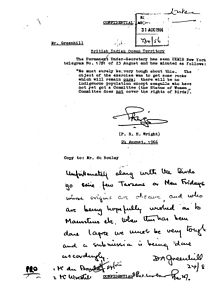Denis Greenhill, Baron Greenhill of Harrow
Denis Arthur Greenhill, Baron Greenhill of Harrow GCMG OBE (1913–2000) was the British Permanent Under-Secretary of State for Foreign Affairs and Head of the Diplomatic Service from 1969 to 1973; a respected expert on the US, Europe and the Soviet Union, he was actively involved in setting postwar Britain's role in the world in a new direction, away from its imperial past and a compliant involvement with the United States towards a more active engagement in Europe. He served under three prime ministers, Harold Wilson, Sir Alec Douglas Home and Edward Heath.
Education and war record
Greenhill was educated at Bishop's Stortford College and Christ Church, Oxford. From 1935-39, he worked for the London and North Eastern Railway. During World War II, he served in the Middle East, Far East, India and North Africa. He was promoted colonel in the Royal Engineers and was mentioned in despatches twice,.[1][2]
His wife, Angela (née McCulloch), whom he married in Cairo in 1941, died in 2013.
Career

He joined the Foreign Office in 1946 with the support of the Labour Foreign Secretary Ernest Bevin, who thought him an expert on oil transportation. He served as counsellor (and later minister) at the British Embassy in Washington, at the time of the Cuban missile crisis (1962) and the assassination of U.S. President John F. Kennedy (1963). As Britain's special envoy to Rhodesia (1972, 1976) he sought unsuccessfully to end Ian Smith's unilateral declaration of independence. He was PUS at the time of Britain's entry into the European Community (1973). His appointment as PUS had been regarded with scepticism by older hands in the Whitehall establishment.
In the event, he was liked and respected by colleagues, his managerial skills were valued and his advice was highly regarded by ministers. Created a life peer in 1974, he sat as a crossbencher.
His later years included roles as governor of the BBC and as a director of BAT Industries, Hawker Siddeley Group, Wellcome Foundation, Clerical Medical and General Life Assurance, S.G. Warburg and Leyland International.
Chagos Islands
After the broadcast of John Pilger's documentary Stealing a Nation (2004), it was revealed that Greenhill was also involved in the expulsion of the Chagos Islanders. The documentary noted that he referred to the Chagos Islanders as being "Tarzans" and "Man Fridays".[3]
He was quoted as noting on the minute: "...Unfortunately along with the birds go some few Tarzans or Man Fridays whose origins are obscure and who are being hopefully wished on to Mauritius...".[4]
Honours
In the 1942 New Year's Honours he was appointed an Officer of the Order of the British Empire (OBE)[5]
In the Order of St Michael & St George he was appointed a Companion (CMG) in 1960,[6] knighted as a Knight Commander (KCMG) in 1967,[7] and promoted to Knight Grand Cross (GCMG) in 1972.[8]
On 31 January 1974 he was created a Life Peer as Baron Greenhill of Harrow, of the Royal Borough of Kensington and Chelsea.[9]
Bibliography
- More By Accident, York, 1992 - Sir Dennis' memoirs
References
- ^ "No. 35209". The London Gazette (invalid
|supp=(help)). 4 July 1941. - ^ "No. 36327". The London Gazette (invalid
|supp=(help)). 11 January 1944. - ^ http://www.johnpilger.com/page.asp?partid=151
- ^ http://news.bbc.co.uk/1/hi/uk_politics/1005064.stm
- ^ "No. 35396". The London Gazette (invalid
|supp=(help)). 30 December 1941. - ^ "No. 41909". The London Gazette (invalid
|supp=(help)). 1 January 1960. - ^ "No. 44326". The London Gazette (invalid
|supp=(help)). 10 June 1967. - ^ "No. 45554". The London Gazette (invalid
|supp=(help)). 1 January 1972. - ^ "No. 46201". The London Gazette. 5 February 1974.
External links
- Use dmy dates from April 2012
- 1913 births
- 2000 deaths
- People educated at Bishop's Stortford College
- BBC Governors
- British Army personnel of World War II
- Chairs of the Joint Intelligence Committee (United Kingdom)
- Crossbench life peers
- Diplomatic peers
- Knights Grand Cross of the Order of St Michael and St George
- Members of HM Diplomatic Service
- Officers of the Order of the British Empire
- Royal Engineers officers
- Permanent Under-Secretaries of State for Foreign Affairs
